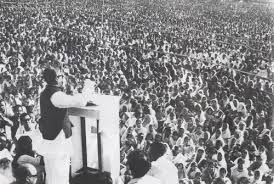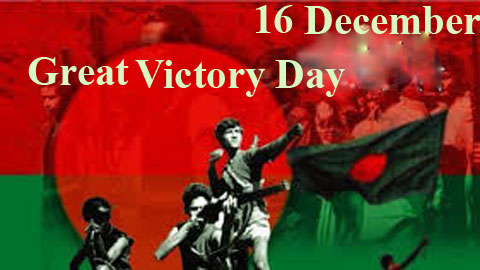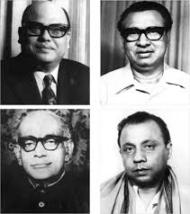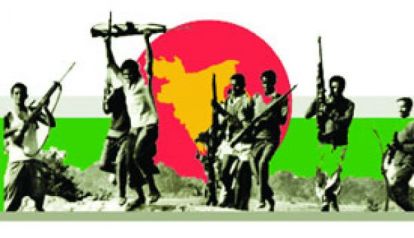Sheikh Iraj and Fazle Rabbi Khan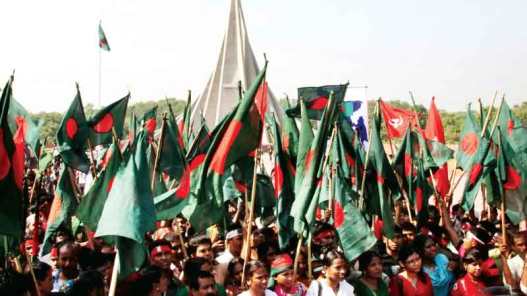
For the people of Bangladesh, December 16_our Victory Day_holds great significance that cannot be described in mere words. People made their utmost sacrifices to make we emerged victorious against the autocratic Pakistan regime. We all know Father of the Nation Bangabandhu Sheikh Mujibur Rahman and his Awami League (AL) party won the 1970 national elections with a clear majority. However, the Pakistan authorities were averse to hand over power to AL.
Bangabandhu had the support of all Bengalis. He declared in his famous speech on March 7, 1971: “This time, our struggle is for our freedom. This time, our struggle is for our independence. Joy Bangla.” The speech made the whole Bengali nation realise the importance of an independent Bangladesh. The barbaric Pakistani army launched a heinous attack on people in Dhaka on March 25 in 1971. The next day, on March 26, our independence was declared and our Liberation War began. After nine months of fighting by our valiant freedom fighters, with the help of Indian armed forces, we defeated the Pakistan army. On December 16, 1971, Pakistani forces led by General Niazi finally surrendered in Dhaka. The new nation of Bangladesh was born. It was a great triumph against a brutal occupying force that had unleashed a reign of terror, killing nearly 3 million Bangladeshis during the 9-month war.
Every year, to mark this glorious day, a number of different programmes are organised. People from all walks of life attend the events, which give both the elderly and the young people a chance to remember and learn about the history of our beloved motherland. As a Bangladeshi citizen, the significance of our Victory Day it is a matter of great pride for us.
The younger generation must know the history of our independence, and live up to the expectations of a free nation that so many sacrificed their lives for. Ahead of the 44th anniversary of our Victory Day, Y&I spoke to some young people to find out what they know about the significance of December 16 and how they celebrate the day.
Shams Saif, 19, recently completed his HSC exams and is looking for admission to a private university.
“It is our Victory Day, the day our country achieved independence through the Liberation War. This is a day of great importance to our nation and is celebrated every year with profound dedication. Many freedom fighters became martyrs for this day, and so it is our duty to remember them with gratitude. This day reminds us to serve the country the martyrs left behind with great care. I normally celebrate the day by hanging out with my friends, we attend different cultural events. During my school years, I have read about the significance of Victory Day and my parents always made sure I knew our history,” Saif said.
Abdullah Al Mamun, 25, works at a private company that sells prosthetics.
He said: “The month of December itself carries great significance for us. From the historical point of view, on this day the Bengali nation was finally free from foreign rulers and a Bengali could govern the country. This day reminds us of the war our forefathers fought so that we can have independence. My family and I pay our respects by putting up our national flag on our rooftop, and we visit the Jatiyo Sriti Shoudho (National Monument in Savar) with flowers each year. I believe the freedom fighters fought for our future. I believe I can best pay homage by doing something for my country.”
Tasbir Jahan Shawon, 25, recently completed MA in Accounting from Mirpur Bangla College. He is currently involved with the ISP (internet service provider) business.
“As a young citizen, I feel proud of the fact that our parents’ generation fought so that we can have freedom. December 16 is very close to my heart. I live in Mirpur, so my family and I show our respect by visiting the Martyred Intellectuals Memorial on December 14 and Jatiyo Sriti Shoudho on December 16. I really enjoy visiting both the places. Every year countless people visit these places and together we share a common feeling of loss, happiness and pride. The feeling is something one cannot describe in words,” Shawon said. 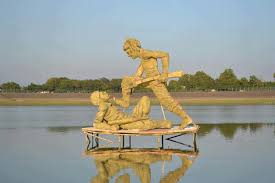
Kazi Shahriar Mahmud, 15, is a class-10 student of Mohammadpur Preparatory School.
“After nine months of gruesome war, on December 16 we emerged victorious against the Pakistan regime. We read about the war in textbooks and we learned about it from our close ones. December 16 is a public holiday and the entire country gets into a festive mood. We attend various cultural events organised on the occasion, and we watch Victory Day programmes on different TV channels. If I don’t go out, then on this day I like to stay home and watch films based on our Liberation War,” said Mahmud.
Raisa Islam Poddo, 14, studies in class 10 at Monipur High School & College.
“December 16 is our ‘Bijoy Dibosh’. On this day in 1971, the Pakistani army surrendered after the nine-month long Liberation War and as a result, Bangladesh gained her victory. This surrender took place at the then Ramna Race Course (now Suhrawardy Udyan) in Dhaka. Every year on Victory Day, our school arranges a function for the students. It usually starts at 7 am. At first we salute the national flag and sing the National Anthem. After that, different people come and speak to us about the Liberation War. Then, we hold cultural programmes. Besides our school programme, I may attend different events that take place in various parts of the city. These kinds of programmes are very important for our generation. There, we get the chance to learn about our victorious and glorious history,” she said.
Suraiya Akter Laiju, 12, is a class-8 student at Green Field School & College.
“The 16th of December is a red letter day in our national history. On this day, we were able to grab our independence after a liberation war for nine long months. It is our Victory Day, I love this day very much. I enjoy this day with my family and friends in a festive mood. I also attend many cultural programmes and drawing competitions on the day,” Laiju said.
Nafis Rafsan, 23, is studying Communication and Media at Independent University, Bangladesh.
He said: “Back in my schooldays during this time of the year, I remember my school holding special assemblies and events in honour of Victory Day. Our teacher used to tell us stories of the brave and the bold, and how we won our independence. She always made sure that we appreciated the value of this day with heart and soul. I also believe it is important to know our country’s history as it is the place where we were born and brought up. The celebration of Victory Day should be in honour of all the freedom fighters, who committed their lives to the country and made sacrifices beyond our imaginations. Happy Victory Day!”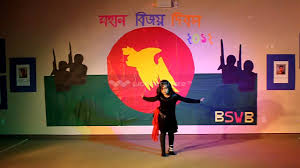
Fardin Shahriar Dipro, 15, is studying in class 10 at Adamjee Cantonment Public School.
“The Victory Day of our country means a lot to us. It was about 45 years ago that our country was under Pakistan. As the country (West Pakistan) was controlling us, they did everything bad with us as much as they could. Day by day, when it became impossible to live with them, our time came. We fought a hard war against them. Though they were stronger than us, our hearts were stronger than them. After a great struggle, we won the war. We got our country free from them. We gained freedom on 16th December, 1971. It is an honorable day for us. On this day, we remember those martyrs because of whom we have a free country,” Dipro said.
“Every year a cultural programme takes place in our school. We get there early. My friends and I enjoy it a lot. Also, we go to the National Memorial. Besides these, I watch many cultural programmes about Liberation War on TV,” he added.
Fatema-tuz-Zohora, 14, is a class-8 student at Green Field School & College.
She said: “Victory Day is the most glorious day of Bangladesh. It is a day of pride and joy for our nation. This day reminds us of the patriotism of our people for the motherland. We celebrate the day ever year in a respectful way to remember the martyrs who laid down their lives for the freedom of our country.”
